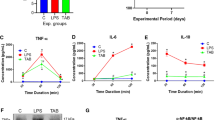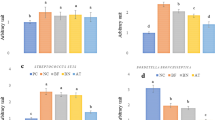Abstract
The existing reports on the role of ω-3 polyunsaturated fatty acids (PUFA) in infectious diseases are contradictory. The present study was conducted to evaluate the effect of sea-cod oil on the course of respiratory tract infection by Streptococcus pneumoniae in BALB/c mice. Animals were given enteral sea-cod oil for a period of 30 and 60 days and challenged intra-tracheally with S. pneumoniae D39 serotype 2. The survival of animals and various inflammatory parameters, i.e. myeloperoxidase (MPO), malondialdehyde (MDA), nitric oxide (NO) and leukotriene B4 in the lung homogenates, were investigated. The inflammatory cytokines levels (IL-1β, TNF-α and IL-10) were also determined. Continuous sea-cod oil supplementation for 60 days significantly improved survival among the animals. A significant reduction in the bacterial load in the lungs of sea-cod oil-fed animals compared to the controls was observed. As the disease progressed, the reduced bacterial colonisation correlated well with the histopathological observation. This was accompanied by a decrease in the production of inflammatory mediators and cytokines in the lung homogenates. However, not even a minor difference was seen in animals given sea-cod oil supplementation for 30 days duration; therefore, long-term treatment was required to attain an effect. Sea-cod oil supplementation modulated the host immune response and, thus, protected the host from ensuing inflammatory damage due to S. pneumoniae-mediated infection.




Similar content being viewed by others
References
Edirne T, Arica SG, Gucuk S, Yildizhan R, Kolusari A, Adali E, Can M (2010) Use of complementary and alternative medicines by a sample of Turkish women for infertility enhancement: a descriptive study. BMC Complement Altern Med 10:11
Raper NR, Cronin FJ, Exler J (1992) Omega-3 fatty acid content of the US food supply. J Am Coll Nutr 11:304–308
Connor WE (2000) Importance of n-3 fatty acids in health and disease. Am J Clin Nutr 71(1 Suppl):171S–175S
Gottrand F (2008) Long-chain polyunsaturated fatty acids influence the immune system of infants. J Nutr 138:1807S–1812S
Stulnig TM, Zeyda M (2004) Immunomodulation by polyunsaturated fatty acids: impact on T-cell signaling. Lipids 39:1171–1175
Damsgaard CT, Schack-Nielsen L, Michaelsen KF, Fruekilde MB, Hels O, Lauritzen L (2006) Fish oil affects blood pressure and the plasma lipid profile in healthy Danish infants. J Nutr 136:94–99
St-Onge MP, Aban I, Bosarge A, Gower B, Hecker KD, Allison DB (2007) Snack chips fried in corn oil alleviate cardiovascular disease risk factors when substituted for low-fat or high-fat snacks. Am J Clin Nutr 85(6):1503–1510
Peck MD, Alexander JW, Ogle CK, Babcock GF (1990) The effect of dietary fatty acids on response to Pseudomonas infection in burned mice. J Trauma 30:445–452
Blok WL, Vogels MT, Curfs JH, Eling WMC, Buurman WA, van der Meer JWM (1992) Dietary fish-oil supplementation in experimental gram-negative infection and in cerebral malaria in mice. J Infect Dis 165:898–903
D’Ambola JB, Aeberhard EE, Trang N, Gaffar S, Barrett CT, Sherman MP (1991) Effect of dietary n-3 and n-6 fatty acids on in vivo pulmonary bacterial clearance by neonatal rabbits. J Nutr 121:1262–1269
Irons R, Anderson MJ, Zhang M, Fritsche KL (2003) Dietary fish oil impairs primary host resistance against Listeria monocytogenes more than the immunological memory response. J Nutr 133:1163–1169
Irons R, Pinge-Filho P, Fritsche KL (2005) Dietary (n-3) polyunsaturated fatty acids do not affect the in vivo development and function of Listeria-specific CD4+ and CD8+ effector and memory/effector T cells in mice. J Nutr 135:1151–1156
Irons R, Fritsche KL (2006) n-3 PUFA fail to affect in vivo, antigen-driven CD8+ T-cell proliferation in the spleen of naïve mice. Br J Nutr 95(4):838–844
Rudan I, Tomaskovic L, Boschi-Pinto C, Campbell H; WHO Child Health Epidemiology Reference Group (2004) Global estimate of the incidence of clinical pneumonia among children under five years of age. Bull World Health Organ 82(12):895–903
Scott JA, Brooks WA, Peiris JSM, Holtzman D, Mulholland EK (2008) Pneumonia research to reduce childhood mortality in the developing world. J Clin Invest 118(4):1291–1300
Balaji V, Thomas K, Joshi HH, Beall B (2008) Increasing invasive disease due to penicillin resistant S. pneumoniae in India. Indian J Med Sci 62(12):492–495
Rudan I, Boschi-Pinto C, Biloglav Z, Mulholland K, Campbell H (2008) Epidemiology and etiology of childhood pneumonia. Bull World Health Organ 86:408–416
Saini A, Harjai K, Mohan H, Punia RPS, Chhibber S (2010) Long-term flaxseed oil supplementation diet protects BALB/c mice against Streptococcus pneumoniae infection. Med Microbiol Immunol 199(1):27–34
Zeng X, Moore TA, Newstead MW, Deng JC, Kunkel SL, Luster AD, Standiford TJ (2005) Interferon-inducible protein 10, but not monokine induced by gamma interferon, promotes protective type 1 immunity in murine Klebsiella pneumoniae pneumonia. Infect Immun 73(12):8226–8236
Greenberger MJ, Strieter RM, Kunkel SL, Danforth JM, Laichalk LL, McGillicuddy DC, Standiford TJ (1996) Neutralization of macrophage inflammatory protein-2 attenuates neutrophil recruitment and bacterial clearance in murine Klebsiella pneumonia. J Infect Dis 173:159–165
Ohkawa H, Ohishi N, Yagi K (1979) Assay for lipid peroxides in animal tissues by thiobarbituric acid reaction. Anal Biochem 95:351–358
Tsai WC, Strieter RM, Zisman DA, Wilkowski JM, Bucknell KA, Chen GH, Standiford TJ (1997) Nitric oxide is required for effective innate immunity against Klebsiella pneumoniae. Infect Immun 65:1870–1875
Doshi M, Watanabe S, Niimoto T, Kawashima H, Ishikura Y, Kiso Y, Hamazaki T (2004) Effect of dietary enrichment with n-3 polyunsaturated fatty acids (PUFA) or n-9 PUFA on arachidonate metabolism in vivo and experimentally induced inflammation in mice. Biol Pharm Bull 27(3):319–323
Duong M, Simard M, Bergeron Y, Bergeron MG (2001) Kinetic study of the inflammatory response in Streptococcus pneumoniae experimental pneumonia treated with the ketolide HMR 3004. Antimicrob Agents Chemother 45(1):252–262
Bergeron Y, Ouellet N, Deslauriers AM, Simard M, Olivier M, Bergeron MG (1998) Cytokine kinetics and other host factors in response to pneumococcal pulmonary infection in mice. Infect Immun 66:912–922
Sijben JW, Calder PC (2007) Differential immunomodulation with long-chain n-3 PUFA in health and chronic disease. Proc Nutr Soc 66(2):237–259
Fernandez R, Piechnik J, Fabris R, Malnic G, Fernandes LC (2004) Effect of chronic fish oil supplementation on renal function of normal and cachectic rats. Braz J Med Biol Res 37:1481–1489
Serhan CN, Savill J (2005) Resolution of inflammation: the beginning programs the end. Nat Immunol 6:1191–1197
Weylandt KH, Kang JX, Wiedenmann B, Baumgart DC (2007) Lipoxins and resolvins in inflammatory bowel disease. Inflamm Bowel Dis 13:797–799
Schwab JM, Chiang N, Arita M, Serhan CN (2007) Resolvin E1 and protectin D1 activate inflammation-resolution programmes. Nature 447:869–874
Blue CE, Paterson GK, Kerr AR, Bergé M, Claverys JP, Mitchell TJ (2003) ZmpB, a novel virulence factor of Streptococcus pneumoniae that induces tumor necrosis factor alpha production in the respiratory tract. Infect Immun 71(9):4925–4935
Acknowledgements
This research was financially supported by the Indian Council of Medical Research, New Delhi, India. We are grateful to Dr. Dong Kwon Rhee, Prof. of Microbiology from the College of Pharmacy, Sungkyunkwan University, South Korea, for providing the Streptococcus pneumoniae strain used in this study.
Author information
Authors and Affiliations
Corresponding author
Rights and permissions
About this article
Cite this article
Saini, A., Harjai, K. & Chhibber, S. Sea-cod oil supplementation alters the course of Streptococcus pneumoniae infection in BALB/c mice. Eur J Clin Microbiol Infect Dis 30, 393–400 (2011). https://doi.org/10.1007/s10096-010-1099-4
Received:
Revised:
Accepted:
Published:
Issue Date:
DOI: https://doi.org/10.1007/s10096-010-1099-4




